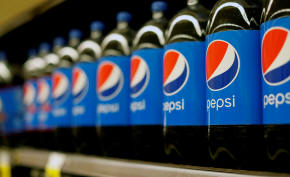|
The
company's shares rose about 1.3% to $172.70 in premarket
trading.
Packaged food makers have so far felt little impact of
decades-high inflation on consumer demand, especially in the
United States, as people prioritize spending on eating at home
rather than at restaurants.
However, signs are starting to emerge that a ceiling on price
increases has been reached with some grocery stores now pushing
back on price hikes from food companies.
Earlier this year, PepsiCo's snack brands briefly disappeared
from shelves at Canadian grocer Loblaw Cos Ltd after the two
companies sparred over price increases.
However, that had little effect on PepsiCo's overall net
revenue, which rose 5.2% to $20.23 billion in the second quarter
ended June 11, beating analysts' estimates of $19.51 billion,
according to IBES data from Refinitiv.
Organic revenue at the company's Frito-Lay North America unit
rose 14% in the reported quarter, with its Doritos, Cheetos and
Ruffles snack brands each delivering double-digit net revenue
growth.
Organic revenue at PepsiCo's North America beverage business
rose 9%.
The company reported a near 40% fall in attributable net income
to $1.43 billion, in the second quarter, as it recorded a $1.4
billion charge primarily related to the write down of some
assets due to the Russia-Ukraine conflict.
"The decline in core operating profit also reflects an increase
in inflationary pressures across our commodity, labor,
transportation and supply chain costs," PepsiCo executives said.
On an adjusted basis, the company earned $1.86 per share,
compared with estimates of $1.74 per share.
PepsiCo said it expects fiscal 2022 organic revenue to rise 10%,
compared to a previous forecast of an 8% increase.
(Reporting by Uday Sampath in Bengaluru; Editing by Shounak
Dasgupta)
[© 2022 Thomson Reuters. All rights
reserved.]
This material may not be published,
broadcast, rewritten or redistributed.
Thompson Reuters is solely responsible for this content.

|
|





